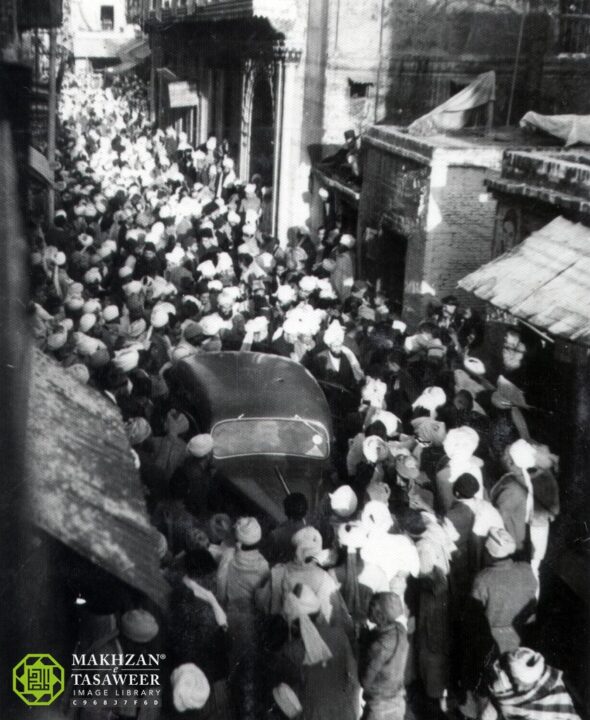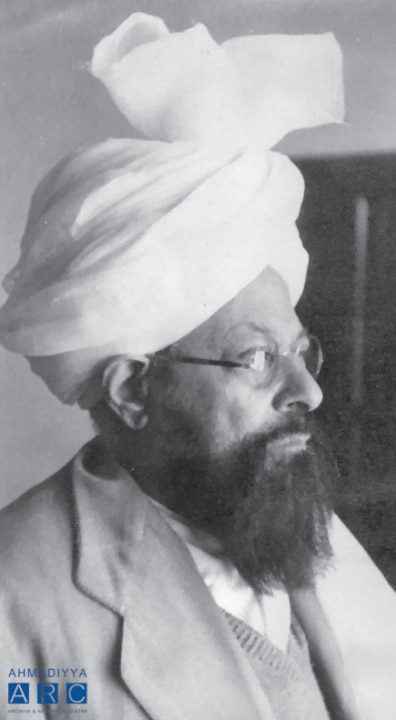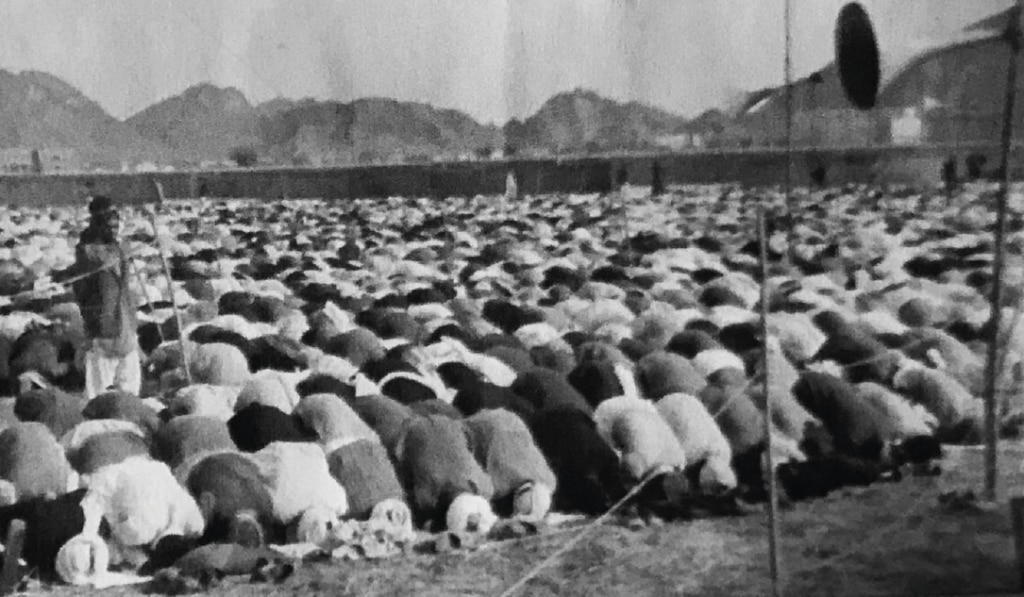Abdul Basit Shahid, Author of Sawaneh Fazl-e-Umar, Vol. III, IV, V

People often ask me what impression Hazrat Musleh-e-Maud’sra grand personality left on me. I always tell them that I don’t even know where to start. I was born in his time, brought up in his time, my student life was spent in his time, I got married and had children in his time, and I started my service as a murrabi-e-silisilah in his time. How can I even begin to count the countless impressions that his life and time have left on me.
I am indebted to him in many ways. However, I will only recount a single incident which might seem singular apparently but has touched the hearts of all those who underwent the episode – the partition of India.
I was born in Qadian and loved the atmosphere so much that I had never imagined ever having to leave it. Even a few days away from it would leave me restless and I would desire to return to my hometown at the first available chance. But when the independence movement finally got to see fruition, it meant that Muslims might have to migrate to the newfound land called Pakistan. My family and I had hoped that this would change and we would never have to leave our beloved hometown of Qadian.
However, it was finally decided that Ahmadis in Qadian will have to migrate and only a handful will remain behind to safeguard the holy sites of Qadian, the birthplace of the Promised Messiah, his lifelong residential quarters (more commonly known as Dar al-Masih) and his last resting place. My father was one of those who chose to stay behind for a cause that was noble not only to the Jamaat but also to humanity at large – the latter being a fact that time will, insha-Allah prove.
It is important to mention here, briefly though, the spirit of this group of people who were termed “Dervish” by Hazrat Musleh-e-Maudra. Hazrat Musleh-e-Maudra had asked for some male members to stay behind and safeguard Qadian. I believe that all men must have offered to stay in Qadian, but not all could be kept behind. My father, Abdur Rahim Diyanat, was lucky to be accepted among the fortunate few.
The whole subcontinent was in a very fragile state. Communal violence was rife, and law-and-order was nullified such that killing someone, and getting away with it was as easy as pie. What I mean to say here is that when my six siblings and I left Qadian to migrate to Lahore, we were fatherless. Our mother, who was expecting my youngest brother, Abdus Salam, was all we had as a parent.
This voluntary and wholehearted decision of my father to stay behind, sending seven of his children with his heavily expecting wife, was out of his sheer love for the Jamaat but was also a direct response to the call of Hazrat Musleh-e-Maudra. His Imam had called and he had responded with great fervour.

He would never have been able to do so if our mother had shown reluctance. Our mother, Amna Begum, gave him the confidence and courage and zeal to readily respond to the Imam’s call. Everything was obscure. People were being slain left, right and centre. My father didn’t know what he was sending us into; and neither did my mother know what she was heading into.
But it was a collective response to the call of their Imam and they both went for it. This shows the level of love both my parents had for Hazrat Musleh-e-Maudra. I can only thank Allah that I was born to such parents. Moreover, I thank my parents, who instilled in my heart, when I was a very young child, the love of Hazrat Musleh-e-Maudra through their practical example.
My mother and father lived apart for nineteen years – right to the end of my mother’s death in 1976; my father lived another four years away from us all in Qadian until he too died in 1980. Thus, these three decades of my life remain a testament to the love that both my parents had for the great man we know as Musleh-e-Maudra. Every day of my father’s life strengthened in our hearts the importance of the call of duty and the level of sacrifice we should all show for Khilafat.
My father used to tell me that initially, he did not intend to send me with the rest of the family so that I could stay behind and make myself useful by helping him. But then, as the lorry carrying a large number of Ahmadis was about to depart, he saw a little gap just beside the driver’s seat and thrust me into that little corner – just in time.
The lorry revved and moved us away from Qadian and into the oblivion of what was now going to be our home. As the lorry left, I remember thinking of my school shoes that I had polished and carefully placed under a cupboard to wear the next day. I remember how much I missed my shoes that I was never going to wear to school again. At that moment, I missed my school and the streets of Qadian, where I had lived for fourteen years of my life. Above all, I missed my father – the father who didn’t even get the time to properly say goodbye to us.
However, bidding farewell was no one’s priority as we drove through the valley of death. Where ever the lorry stopped for short breaks, men would come running and beg the driver to get their daughter across the border. They begged that once their daughters were safely on board, they wished for themselves to be shot dead so that they never get to know what happened to their daughters during or after migration – an episode that seemed apocalyptic.
My mother later told me that she could hardly get a glimpse of me as I sat in a little corner by the driver’s side. She said she was constantly worried that I might fall off the lorry. But by the grace of Allah, I didn’t and by the grace of Allah, I lived to see how Hazrat Musleh-e-Maudra sailed the Jamaat so successfully through a storm that then seemed too rough to ever come to an end.
When we arrived in Lahore, we were taken to a refugee camp called Ratan Bagh. We were pleasantly surprised to see that Hazrat Musleh-e-Maudra had already arrived and had arranged for this building and its compounds to accommodate Ahmadis migrating from Qadian and other parts of India.
As we disembarked the lorry, it was like we had come back to life, and getting to know that Hazrat Musleh-e-Maudra had arranged for us Ahmadis to live together in Ratan Bagh was a feeling of reassurance that we had never before experienced.
In circumstances where everyone only cared for themselves or their families, Hazrat Musleh-e-Maud’sra care for all Ahmadis showed the great love he had for the Jamaat of the Promised Messiah. This incident, which I remember very well, drew my heart closer to my Imam and master and his love sat so deeply in my heart that it continues to live there even today – three-quarters of a century on.
Ahmadis would live in Ratan Bagh and then move on to where they were allocated to live; more caravans carrying Ahmadis from Qadian and other parts of India would arrive and settle in this abode of peace – a rare commodity in those circumstances – that Hazrat Musleh-e-Maudra had arranged for them.
Not only did Hazrat Musleh-e-Maudra arrange for this temporary accommodation, but he also had a langar (kitchen) set up to provide food for immigrant families. The food was very simple but precious, for there were hundreds of thousands who died of hunger during those days. We, who had left their father behind as a dervish, never felt for a moment that we had no guardian. It was as if Hazrat Musleh-e-Maudra had become our guardian and had taken us under his wing of mercy and compassion. This, and many other aspects of Hazrat Musleh Maudra, made me and millions of others fall in love with him forever.
As I mentioned earlier, families of immigrants would stay in the abode of Ratan Bagh until they could go out and find their feet in their new lives in Pakistan. Hazrat Musleh-e-Maudra would ensure that the families were not risking themselves by making a wrong move in an already challenging scenario. But with the families of dervishes – knowing that they had left their husbands and fathers behind – he would show special care and deep affection. As the families of dervishes left Ratan Bagh, Hazrat Musleh-e-Maudra would personally be present at the Lahore railway station to see them off under his supervision. I can still remember him calling out the names of families and asking them if all their luggage was with them and ensuring that all family members were boarding the train together.
I had left Qadian as a foundation stage student of Madrasa-e-Ahmadiyya. Hazrat Musleh-e-Maudra was keen to have all institutions of the Jamaat reinstated and fully functional. For that, he did not wait for buildings to be acquired or allocated by the government, rather, he set every organisation into motion, even if it meant working under the shade of a tree. Madrasa-e-Ahmadiyya was established in a stable where horses had been looted and all that was left was a shed with unpleasant reminders of its once-upon-a-time occupants. We cleaned it very thoroughly (as thoroughly as a stable can be cleaned) and the Madrasah was up and running, albeit with only one teacher who would sit us all around him and teach us students who had managed to migrate and reassemble.
Hazrat Musleh-e-Maudra once visited the Madrasah in Ahmad Nagar and, I recall him saying: “The Ahmadiyya vanguard is all set!” This inspired all of us and we put all our energies into living up to the great expectation that he had expressed through these words – his magical words. He was a man of magical charisma. Anyone who got to meet him was left enchanted.

Madrasah Ahmadiyya was first set up in Chiniot and then Ahmad Nagar before moving to Rabwah. Senior classes moved to Ahmad Nagar first and we, the junior classes, followed later. While in Chiniot, my late friend Abdul Hakim Akmal and I walked the few miles to Ahmad Nagar through the then barren land that had been purchased and was later to be named Rabwah. It was as if we had walked into a desert of saline sand, our feet immersed up to five or six inches in its barren soil. We both looked at each other in shock, thinking that nothing could become of this land.
However, when Hazrat Musleh-e-Maudra set foot on this land, and started to live there in the tent city, we saw mud quarters emerge. One of such quarters was Hazrat Musleh-e-Maud’sra own residence. Then came water, and plants and trees followed and then came the days when Rabwah blossomed into a vibrant town with amenities that even some big cities remained devoid of.
Rabwah is undoubtedly a miracle that became manifest at the hand of Hazrat Musleh-e-Maudra – especially for people like me who have seen it in both its barren days and in its heyday today.
I will conclude this piece with an incident that has left a very deep mark on my mind and soul. Many years after the partition, my mother asked me to write to my father and tell him that he had fulfilled his pledge of being among those who safeguarded Qadian in the turbulent days of the partition. She requested that he now join his family in Rabwah.
The reply we received from my father still leaves me moved when I recall it. He wrote back: “Tell your mother that I can return if she insists. But I made a pledge to Hazrat Musleh-e-Maudra and there was no time limit to it. It is incumbent on me to fulfil my pledge until my last breath. And also ask her that even if I decide to return, what guarantee is there that I will even survive without Qadian?”
My mother never repeated her request. She too had great love for Hazrat Musleh-e-Maudra and also for her dervish husband. Both my parents had inculcated this love in our hearts through their practical example, and by the grace of Allah, it remains as pure today as it ever was, if not ever-growing by the day.
When I returned to Rabwah after my services in Africa, I was assigned the duty of writing the biography of Hazrat Musleh-e-Maudra. Hazrat Khalifatul Masih IVrh had written the first two volumes before he became Khalifa and had assigned me to write the remaining three volumes.

By the grace of Allah, I was able to put together the three volumes. The work is in no way complete or even satisfactory. How could it be? It is simply impossible to do justice to the great man who was born according to the prophecy of the Holy Prophet and that of his servant, the Promised Messiah. However, I feel humbled that I got the chance to write about his blessed and very eventful life. May Allah accept this humble effort of mine as my tribute to the man I loved and still love from the core of my heart. The man, most admirable: The Musleh-e-Maudra.

